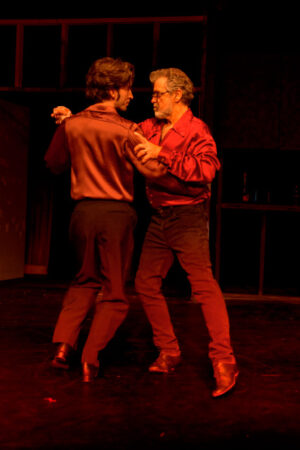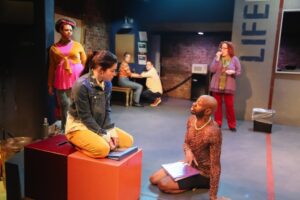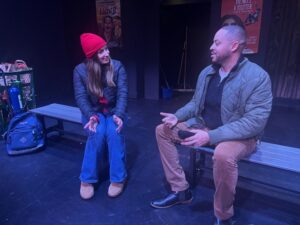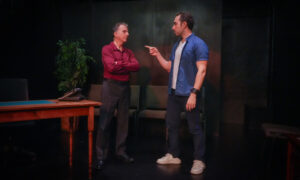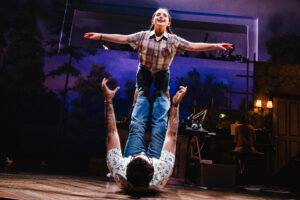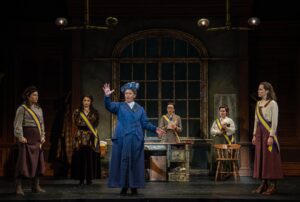If Boston Huntington’s opening of The Light in the Piazza is predictive, this latest incarnation of the almost-classic American musical sung and spoken largely in Italian is a hit! The audience, noticeably dressed to the teeth and sparkling, gave thunderous applause after multiple songs and scenes and the full house was on its feet and cheering well before the first curtain call. Maybe these were just the crème de la crème of Boston’s musical theater cognoscenti, families and friends of the large cast or speakers of Italian, but clearly they loved it. With some excellent reasons.
Book writer Craig Lucas suggests that the story has an ancient, fairy tale resonance, a concept nowhere more evident than in Andrew Boyce’s scenic design. Seemingly sweet, young and American Clara Johnson (Sarah-Anne Martinez) is literally dwarfed by oversized Roman artifacts – a crumbling pillar, a classic male nude statue seen at first from the back – as she sings “Statues and Stories” with her mother, Margaret (Emily Skinner). It’s June of 1953 in Florence, and the pair are vacationing, Margaret reading aloud from a red guidebook as stock characters – a wizened flower vendor, children playing, a nun – come and go. But throughout, the human story is drawn against an ever-shifting backdrop of gigantic elements – Roman arches, a painted crucifix, dark rectangles defining both spaces and time. The design is impeccable and breathtaking.
Margaret Johnson is loving and protective of Clara, pulling her away when handsome, young Fabrizio Naccarelli (Joshua Grosso) captures Clara’s windblown hat, signaling the cute-meet beginning of the tale. Of course the two fall into classic young love, but something’s amiss in Margaret’s quietly desperate unease, played with an expansive subtlety by Skinner, at Clara’s adult need for Fabrizio’s love.
There follows a family backstory illustrating two stages of love that evolve beyond Clara and Fabrizio’s untutored ecstacy, and ending in a third and final stage in a phone call between Margaret and her absent husband, Roy (Rob Richardson.) Married Giuseppe and Franca Naccarelli (Alexander Ross and Rebekah Rae Robles), only slightly older than Fabrizio, bicker angrily, while parents Signor and Signora Naccarelli (William Michaels and Rebecca Pitcher) have reached a mature and tolerant understanding of their bond. Michaels is a polished charmer as the suave, knowing patriarch, and Pitcher wonderful as the fashionable and wise “older woman” in an audience-pleasing character break speaking English to the house just to “explain what’s going on.” And the final stage of love, its dissolution, is evident in that transatlantic phone call between Margaret and husband Roy. Margaret, having failed to tell the Naccarellis that Clara, as a result of a kick by a pony when she was five, sustained brain damage and is cognitively impaired. Intellectually, Clara is permanently arrested at ten or twelve, while her body is that of a 23-yr-old woman. With very few lines, Richardson’s Roy manages a deep presence in the story as the voice of reality uncomfortably felt by every mature adult in the audience. He forbids the marriage, stating the fact that Clara is incapable of the responsibilities of marriage and motherhood. Margaret defies him, saying that the Naccarelli clan care for Clara and will step in where she fails. The love between Margaret and Roy, celebrated on a long-ago honeymoon in Florence, is finished.
The story is captured in Adam Guettell’s sophisticated, Sondheim-like score and lyrics that for appreciation require a refined musical taste. Not everyone can bring that to the theater, but on opening night, everyone did. Amid the seventeen songs belted in Italian, English and a bit of Latin, one seems to hold a core message, “Let’s Walk.” Margaret meets Signor Naccarelli alone after he has seen Clara sign her name in a childish scrawl, including her age. He forbids the marriage because Clara is older than Fabrizio, but Margaret invites him to walk with her, and he relents. And they keep walking. As everyone must do at every stage of love or its change or its absence. That walk is the light in the secret piazza of every life, on stage in a somewhat Gordian play that continues to captivate audiences again and again.
Book by Craig Lucas, Music and Lyrics by Adam Guettel, Loretta Greco, Norma Jean Calderwood Artistic Director, Christopher Mannelli, Executive Director
The Huntington Theatre, 264 Huntington Avenue, Boston, MA, 02115. May 8 – June 15, 2025


